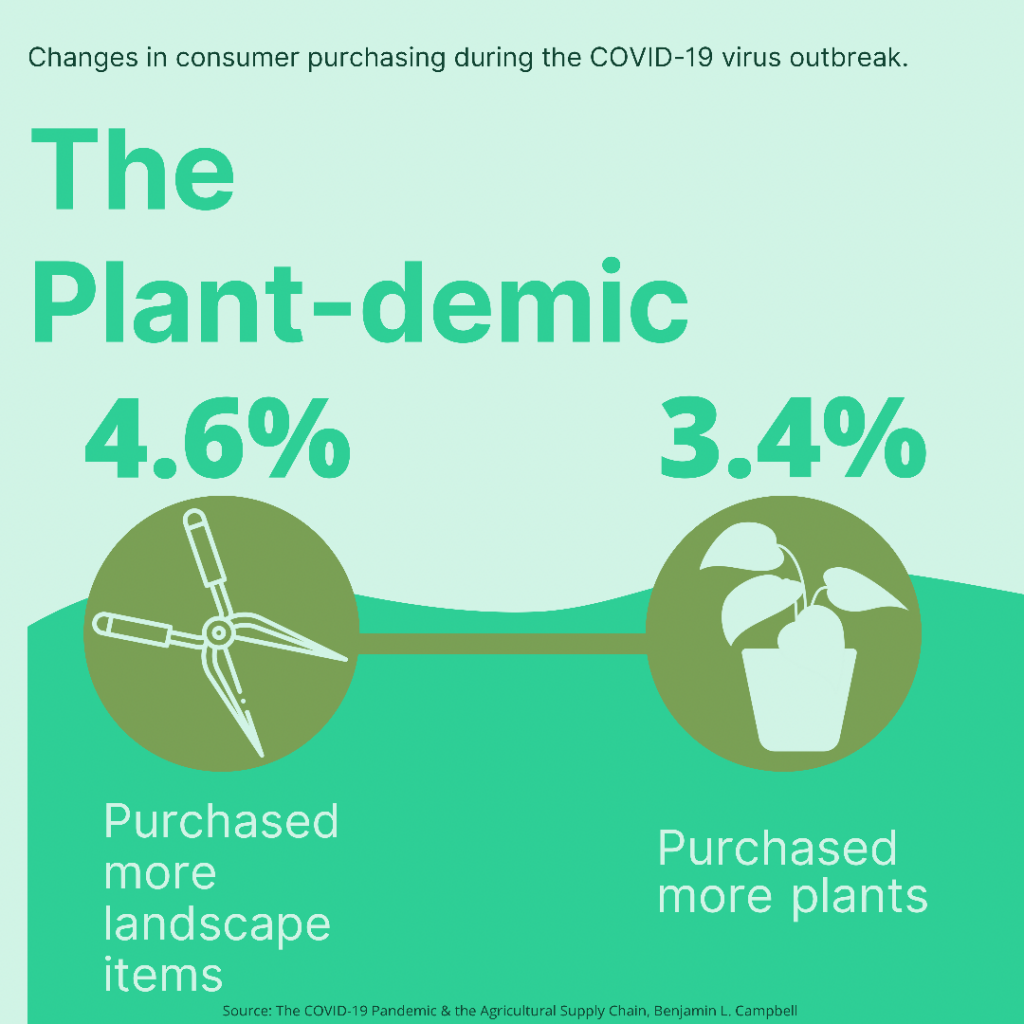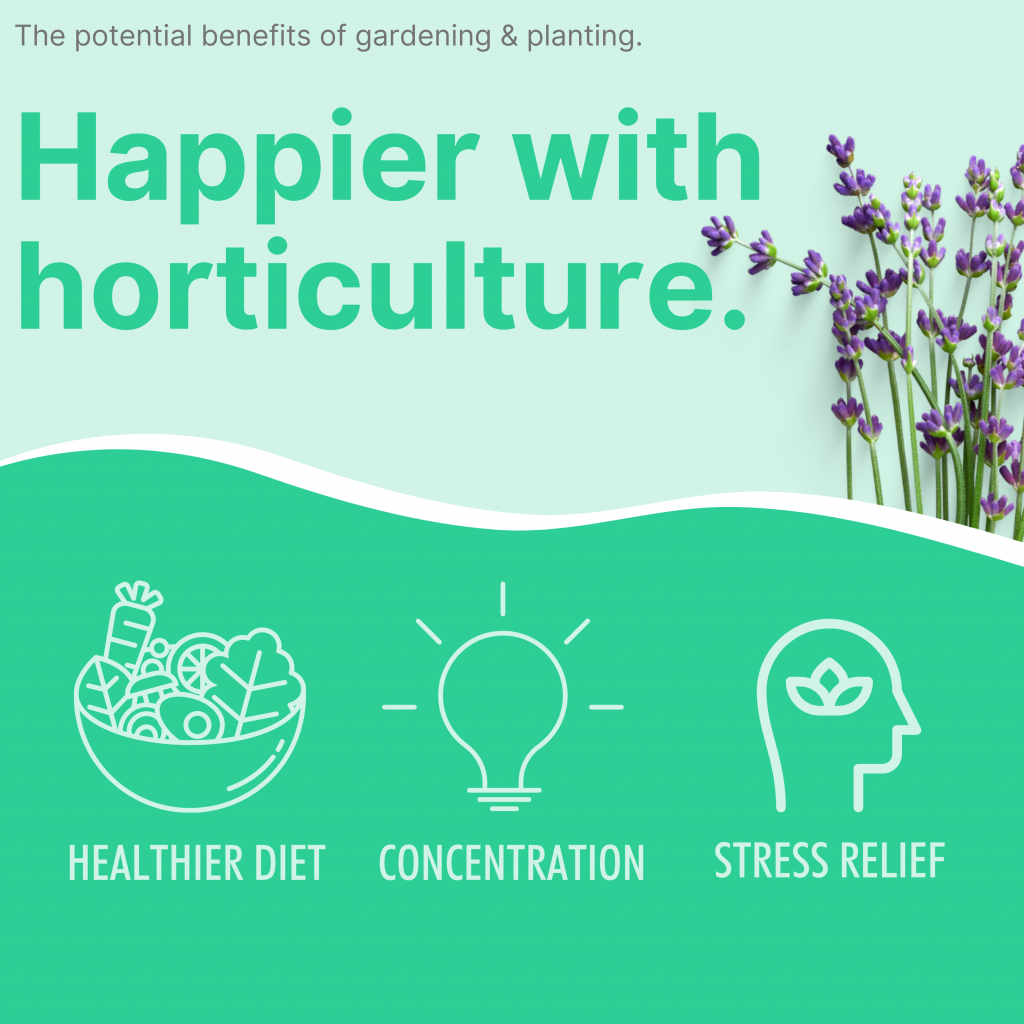From planting gardens to baking bread, the COVID-19 lockdown took some interesting turns in the name of boredom. Now, not only are plants continuing to flourish from our nation’s new interest in gardening, people have also begun witnessing the positive changes horticulture has to offer for mental health.
Why It’s Newsworthy: The COVID-19 gardening trend that’s outlasted our short term quarantine, but continues to benefit the long term mental health of those who participate in gardening.
According to this recent Statistica study, “The market size of the plant and flower growing sector in the United States reached 15.34 billion U.S. dollars in 2020…The sector was forecast to increase by 1.8 percent in 2021.”

Horticulture’s benefits on health have been around since before the words “Coronavirus” and “pandemic” became everyday buzzwords.
Wellstar Cobb Hospital has been using horticultural therapy (HT) to help seniors deal with the harsh realities of growing older since November of 1992.
Additionally, a study for the Journal of Environmental Research and Public Health concluded “The evidence supports that HT is effective in increasing mental well-being, engagement in meaningful activities.”
Taking things away from the national scope, our Athens bubble has certainly taken part in the increase of plant and gardening sales from the pandemic.
Willow Samsel, a manager at Sunrise Nursery in Winterville, Georgia, recently opened for the fall season and admits sales have been rising ever since the pandemic.
“We saw people buying food plants, things to garden and things to homestead,” said Samsel.
Putting her green thumb to good use, Samsel even rehabilitated her own home garden, but it’s not just about the aesthetic appeal.
“I left work and just dug through my garden, I think people are just starting to get outside for their mental health,” said Samsel.
The Athens area is no stranger to big lawns and green spaces thanks to the University of Georgia’s vast campus. Not only do these lawns, gardens and spaces provide an aesthetically pleasing study spot, they actually help students focus more.
According to this study in Applied Psychology: Health and Well-Being, “previous findings collectively suggest that it is time for randomised clinical trials testing the impacts of regular exposure to greenspace as a treatment for ADHD.”
Greenspaces have proven to help elementary school students focus and reduce symptoms of ADHD. Fortunately, these greenspace benefits are not just bound to school children.
State Master Gardener Sheri Dorn studies the human aspect of horticulture. Dorn likes to dig deeper when it comes to understanding why people garden and advocates for people of all ages to take advantage of greenery.
“That’s the cool thing about plants. We can study specific age groups, whether you’re in third grade, a sophomore in college or a senior in a residential facility. We can study all those age groups and we still see the positive impacts, the positive influence of plants, the relaxation and mental restoration,” she said.
Athens-Clarke County has also taken part in building outdoor spaces for locals. The Oconee River Greenway is a family-friendly trail system that features various points of interest.

The short-term benefits of gardening include a healthier diet, physical activity and relaxation.
“So, short term, obviously we can eat fresh foods. Maybe we can diversify our diet and certainly get exercise,” said Dorn.
Dorn especially enjoys being able to come home from a long day at work and stay focused on what really matters.
“You can have an immediate mental change. You can be engaged in what’s going on in your yard and really dial back that stress and mental fixation on your work,” she said.
In the long term, people may see lower stress levels and a higher level of wellbeing.
One notable benefit of gardening can even be advantageous to an entire community. As stated by Dorn, studies show that people who actively garden are more aware of what’s going on in their community and neighborhood.
“That’s significant food for thought right now given the level of social conflict that faces us every day. It’s pretty significant to think about how simple flower pots on our front porch have been connected to reduced crime rates in communities. As people garden and take care of their landscapes, property values rise and communities become desirable places,” said Dorn.
On the other hand, green spaces face some limitations when it comes to negative externalities affecting the success of the garden.
These negative outcomes include invasion of privacy for some residents who live close to these greenspace areas and increased numbers of strangers near the premises. Additionally, some residents noted increased fear of noise, littering and vandalism.
The American Community Gardening Association tells readers most gardens can not afford troubling neighbors or crime in the garden area at all.
To combat these problems for a more sustainable future, the organization recommends communities “…choose bylaws carefully so you have procedures to follow when members fail to keep their plots clean and up to code. A well-organized garden with strong leadership and committed members can overcome almost any obstacle.”
Now vaccine distribution is in the works and COVID-19 quarantine has come and gone, but all the plants are here to stay.
According to this Axiom study, more than 80 percent of people surveyed felt successful in their gardening. This gives many new gardeners an incentive to keep reaping the benefits of tending to their plants.
Citizens living in city apartments often don’t have access to an outdoor green space or garden area. Luckily, these benefits work for indoor gardening too.
Cat Comis, an Atlanta resident, does not have many options when it comes to building a large gardening space.
“I love gardening. I garden on my patio because I live in a little box right now and that’s my only outdoor space,” she said.
Another recent study completed by Axiom reveals that 46 percent of people say indoor gardening with houseplants is a meaningful activity.
Whether it’s an indoor stand or an outdoor garden, people are taking back their attention with plants.
“It’s in those spaces that people connect, and it’s the plants that provide common ground. People of all nationalities, faiths, skin colors, genders … they come together and they get to know each other. It’s the plants that are kind of the proverbial glue that brings the people together,” said Dorn.
Gianna Perani is a senior majoring in journalism and minoring in communications with a certificate in sports media at the University of Georgia.









Show Comments (1)